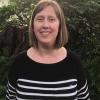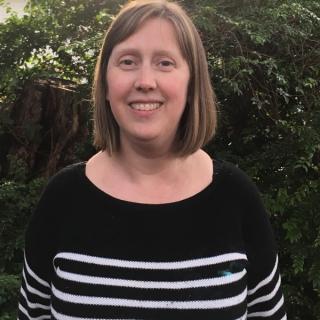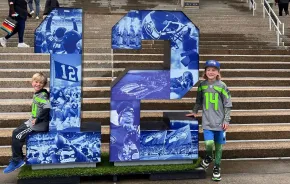
Photo:
David Domke and Christina Gould. Photo credit: Will Austin
These two superheroes met more than a decade ago, during a Seattle Arts & Lectures series about the then-upcoming 2012 presidential election campaign. Christina Gould was working the event, and professor David Domke was one of the speakers. Looking back, Gould recalls how taken she was with Domke’s thesis. “His lectures, which take an historical approach to the current political situation, then and now, are accessible, engaging and impeccably researched. Delivered with charm and earnestness — with the best PowerPoints ever by a professor in shorts, no matter the temperature — it captivated me.”
At the time, Domke was a tenured professor in the Communications Department at the University of Washington, where he focused on the racial and religious dimensions of American politics. The publication of his first book in 2004 launched him into the public spotlight, and soon he was helping grassroots organizations and candidates running for office with their communication strategies. As the years went on, he became more involved in the public arena, but it was the 2016 election that had a profound impact on his professional focus, and he made a decision to leave academia.
That’s when their stories come back together — both Gould and Domke now work at Common Power, an all-volunteer initiative that works to “foster, support and amplify a democracy that is just and inclusive.” Domke established the organization in 2018 and serves as its associate director; Gould is a valued advocate, contributor and volunteer.
In conversation, both spoke about their desire to uphold democracy as a motivation for their work. “Losing it is not acceptable; the consequences if we do are horrifying,” explains Gould. And according to Domke, the way to uphold it is to be active. “It’s not enough to hope, or want, or wish or desire,” he quotes a personal hero of his, John Lewis, “We have to move our feet.” Gould echoes this resolve. “We have a lot to lose as a society if we do not participate.”
Common Power serves as an “on-ramp” for people looking to participate, to move their feet. The metaphor Domke uses to describe the organization is to call it the Apple store for civics. It provides volunteers with the opportunity to attend lectures, to participate in fieldwork — making phone calls, registering people to vote, writing letters — to build community and connections, to share a sense of belonging and, according to Gould, “to participate in history in the making while understanding our country’s past history.”
Domke notes that although many people feel strongly about issues and want to take action, they often feel overwhelmed by information, frustration or even fear. Many opt out of participating because it feels like their actions won’t have an impact. In response, Domke refers to a quote by Edward Everett Hale about his cousin Helen Keller: “I am only one, but I am one. I cannot do everything, but I can do something. And because I cannot do everything, I will not refuse to do the something that I can do.” As Domke says, “Democracy is a verb.” He believes that if you show up and keep showing up, good things can come out of it.
When asked how ParentMap readers can get involved and support Common Power’s work, Gould encouraged people to exercise their right to vote. “I believe that it is a precious right that we can all exercise, albeit some more easily than others; it is an action that can give us a voice, preserve our freedoms and democracy.” She also encourages readers to look into Common Power, learn about the organization and take action in whatever way suits them — through time or treasure.
What book or podcast are you recommending right now?Gould: I recommend the historian Heather Cox Richardson’s book “Democracy Awakening: Notes on the State of America.” It is a narrative that explains how our democracy teeters on the brink of autocracy and how we can turn it back. Domke: I’m recommending “The Ezra Klein Show” [pocast] as well as “Freedom’s Dominion: A Saga of White Resistance to Federal Power” by Jefferson Cowie — a book that has had the most influence on me in the last few years. It’s a Pulitzer Prize winner and examines the way in which white Americans have defined what “freedom” is. How can parents teach children to repair a broken world?Gould: I think parents can model and teach their children of all ages to be kind and generous and that “all people are different people” and that’s okay. And that civic engagement is an important part of the whole that fosters community, connection and belonging, which benefits all. Domke: They can decide to try and make a difference, and to say, with integrity, to their children, “I don’t know if we can make this place a better place, but we’re going to try.” What daily habit or routine is most important to you?Gould: My daily routine is to walk my dog, Ella, which keeps us both healthy and happy and centered! Domke: I lap-swim about an hour almost every day. That time is incredibly generative and meditative. It’s also separated from technology and all of the fears or anger or whatever else I’m feeling. It’s a chance to just reflect and think. That hour is precious and a privilege. |











